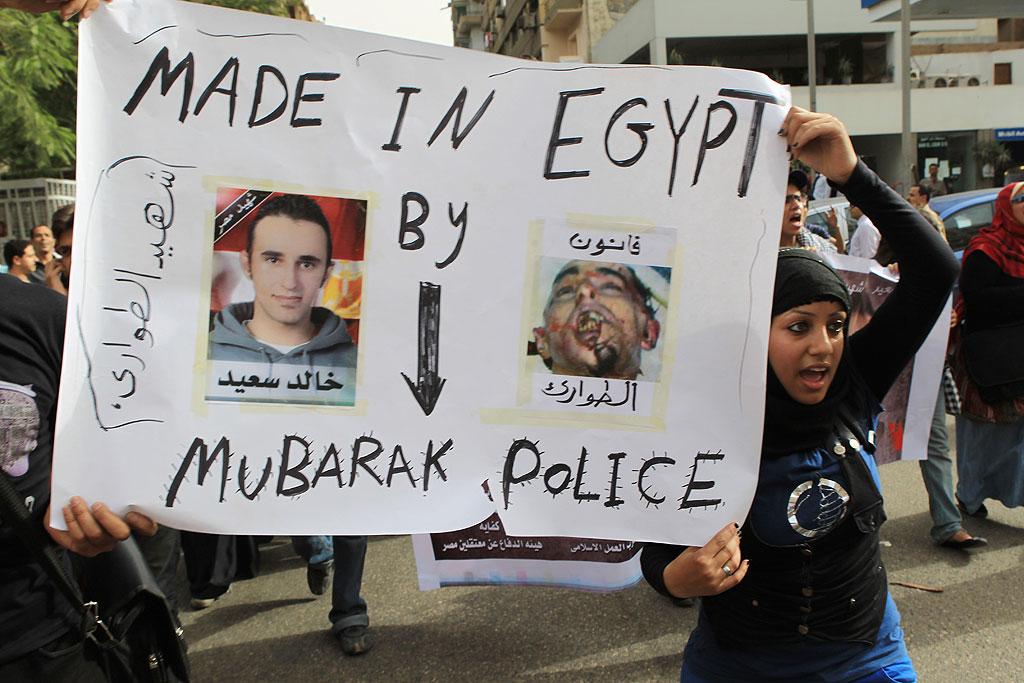Egypt: prisoner dies after alleged police torture
Egyptian youths demonstrate in the heart of Cairo on June 20, 2010 against the killing of alleged torture victim Khaled Said (portraits), who was reportedly tortured to death by the police in the northern port city of Alexandria.
The death of a 23-year-old Egyptian prisoner this week, allegedly tortured and killed by the man’s police handlers during detention, sparked a new wave of anger and protests on the streets of downtown Cairo on Friday.
Most of the anger on Friday night was not directed toward the police, but at Egypt’s ruling military council, which assumed power after the ouster of former president Hosni Mubarak earlier this year.
Essam Atta, a detainee who was serving a 2-year sentence in a Cairo prison, reportedly died on Wednesday evening after being tortured by police, according to Egyptian activists.
A local human rights group claimed that Atta was tortured to death in prison by guards after the 23-year-old had attempted to sneak a mobile phone card into his cell.
Al-Masry Al-Youm, citing the local human rights group, reports:
After guards discovered the SIM card, “Atta was subjected to brutal torture, with guards shoving one hose into his mouth and another into his anus, which led to his death.”
The same newspaper cited eyewitnesses at the hospital where Atta eventually died who saw water coming out of the man’s orifices. One also said Atta was foaming at the mouth. Several prisoners in the Cairo jail also claimed to witness Atta’s torture by guards.
A picture of Atta’s corpse has been published in several Egyptian papers, including this one (caution: the image is graphic).
In Tahrir Square, hundreds of demonstrators marched alongside several young men who carried Atta’s body in a coffin over their heads. The coffin was being taken to a nearby mosque for funeral prior to burial later on Friday.
More from Cairo: Egyptian military forcibly quells protest in Cairo
Some of the protesters were crying. But most pounded their fists into the night sky, chanting against Egypt’s military leadership. Atta, who was arrested in February, was tried and sentenced in a controversial military tribunal.
Egypt’s army has come under fire in recent months for the military trial, and has faced multiple allegations torture since Mubarak’s departure.
In March, the military reportedly carried out “virginity tests” on some female detainees who were arrested during a protest in Tahrir. Last month, a widely circulated video on the internet showed men in military uniforms electrocuting two male detainees in northern Egypt. And earlier this month, 27 protesters were killed during a Coptic-led rally in Cairo that was dispersed after military vehicles plowed into the crowds.
“The military is killing us!” screamed Mohammad El Agiery outside Atta’s funeral near Tahrir. “They fight us with any possible means. Every single week I lose a friend.”
Atta’s death comes just days after two Egyptian policemen were sentenced to 7 years in prison for the killing of Khaled Said. Said’s torture by police in the coastal city of Alexandria in 2010 fueled much of the popular anger that led to the uprising against Mubarak this January.
"This is Khaled Said's death all over again," Mahmoud El Makhzangy, a 24-year-old protester, told GlobalPost outside Atta's funeral.
A lawyer from Atta has asked Egypt's chief prosecutor for a complete investigation into the death, reports the Associated Press.
The story you just read is accessible and free to all because thousands of listeners and readers contribute to our nonprofit newsroom. We go deep to bring you the human-centered international reporting that you know you can trust. To do this work and to do it well, we rely on the support of our listeners. If you appreciated our coverage this year, if there was a story that made you pause or a song that moved you, would you consider making a gift to sustain our work through 2024 and beyond?
